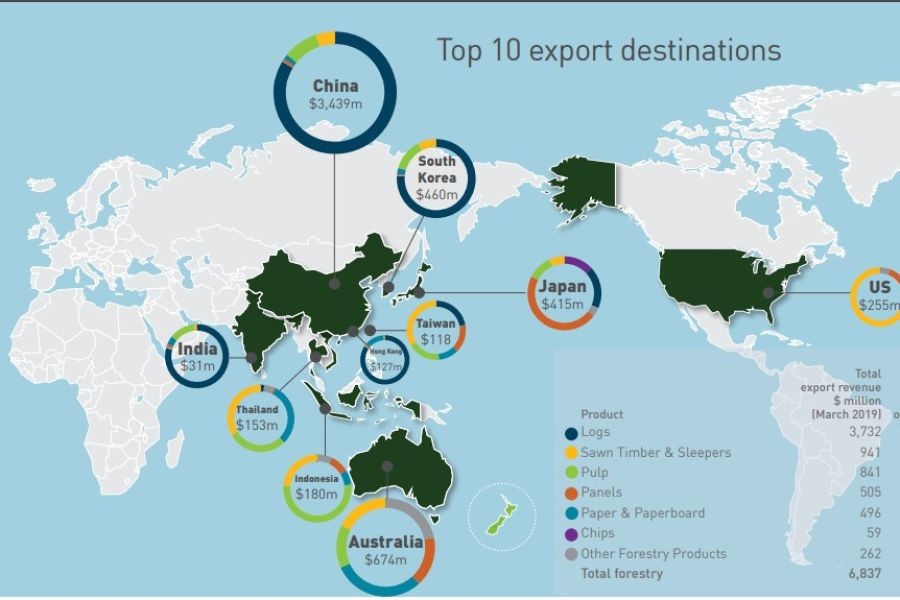New Zealand, often celebrated for its breathtaking landscapes and rich cultural heritage, quietly holds a powerful economic engine: its export sector. The significance of exports to New Zealand's economy can't be overstated, as they fuel growth, create jobs, and enhance international relationships. However, beneath the surface of this vibrant economic landscape lies a complex web of challenges and opportunities. This article delves into how New Zealand's exports contribute to the national economy, offering a comprehensive analysis enriched with data, expert insights, and real-world case studies, making it an essential read for strategic business consultants.
The Evolution of New Zealand's Export Sector
The journey of New Zealand's export sector reflects the nation's adaptability and innovative spirit. Historically rooted in agriculture, the sector has diversified significantly over the decades. In the 1970s, over 70% of exports were agricultural products. Fast forward to today, and while agriculture remains crucial, services and high-tech goods have gained prominence. This evolution is driven by strategic governmental policies aimed at opening new markets and diversifying export portfolios.
Data-Driven Insights
According to Stats NZ, exports contribute approximately 30% to the country's GDP. This figure underscores the sector's critical role in sustaining economic stability. Furthermore, a report by the Ministry of Business, Innovation, and Employment (MBIE) highlights that the export sector supports over 600,000 jobs, directly impacting livelihoods across the nation.
Case Study: Fonterra – A Dairy Giant's Global Footprint
Problem: Fonterra, a cooperative dairy company, faced declining demand in traditional markets due to changing consumer preferences and geopolitical tensions.
Action: To counteract this, Fonterra diversified its product offerings and pursued new markets in Asia and the Middle East. They also invested in sustainable practices, aligning with global trends towards eco-friendly products.
Result: Within three years, Fonterra reported a 15% increase in revenue from Asian markets and a 10% reduction in production costs due to sustainable practices.
Takeaway: The case of Fonterra illustrates the importance of market diversification and sustainability in enhancing export resilience. New Zealand businesses can learn from this by exploring new markets and prioritizing sustainability to meet global demand shifts.
Contrasting Viewpoints: The Export Dependency Debate
While the benefits of a robust export sector are evident, there are contrasting perspectives on New Zealand's heavy reliance on exports. Advocates argue that exports are essential for economic growth and provide access to global markets. However, critics caution against over-dependence, citing vulnerabilities to global market fluctuations and geopolitical tensions.
Advocate View: Proponents highlight that exports drive innovation and competitiveness, essential for economic vitality.
Critic View: Critics warn that too much reliance on exports can expose the economy to external shocks, as witnessed during global trade disruptions.
Middle Ground: A balanced approach involving export diversification and strengthening domestic industries can mitigate risks while capitalizing on export benefits.
Common Myths & Mistakes in Exporting
- Myth: "Exports only benefit large corporations."
- Reality: Statistics from NZTE show that small and medium-sized enterprises (SMEs) contribute over 40% to export revenue, illustrating the sector's inclusivity.
- Myth: "Exporting is too risky for SMEs."
- Reality: With proper market research and risk management strategies, SMEs can successfully navigate exports. Support from agencies like New Zealand Trade and Enterprise (NZTE) provides essential resources.
Pros and Cons of Exporting
- Pros:
- Access to larger markets, increasing revenue potential.
- Enhanced innovation and competitiveness through exposure to global trends.
- Job creation and economic growth.
- Cons:
- Exposure to global market volatility.
- Compliance with international regulations can be complex.
- Potential over-reliance on specific markets.
Future Trends & Predictions
The future of New Zealand's export sector is poised for transformation, driven by technological advancements and changing global dynamics. According to a Deloitte report, digital exports, including software and IT services, are expected to see a 50% growth by 2028. This shift signifies the critical role of technology in shaping the export landscape.
Moreover, sustainability will become a cornerstone of export strategies. As global consumers increasingly prioritize environmentally friendly products, New Zealand exporters must align with these preferences to remain competitive.
Conclusion
New Zealand's export sector is a testament to the country's economic resilience and adaptability. By understanding the intricate dynamics of this sector, strategic business consultants can identify opportunities and mitigate risks. As you reflect on the insights shared, consider how your business can leverage these trends for sustained growth. What strategies will you implement to ensure your business thrives in this evolving export landscape?
We invite you to share your thoughts and experiences in the comments below. How have exports impacted your business strategy?
People Also Ask (FAQ)
- How does New Zealand's export sector impact the economy? Exports contribute about 30% to New Zealand's GDP and support over 600,000 jobs, highlighting their vital role in economic stability and growth.
- What are common misconceptions about exporting in New Zealand? Many believe that exporting is only for large corporations, but SMEs contribute significantly to export revenue, proving its accessibility and potential for all business sizes.
Related Search Queries
- New Zealand export economy
- Top exports of New Zealand
- Impact of exports on New Zealand GDP
- Sustainable exporting practices in New Zealand
- Future of New Zealand's export sector































